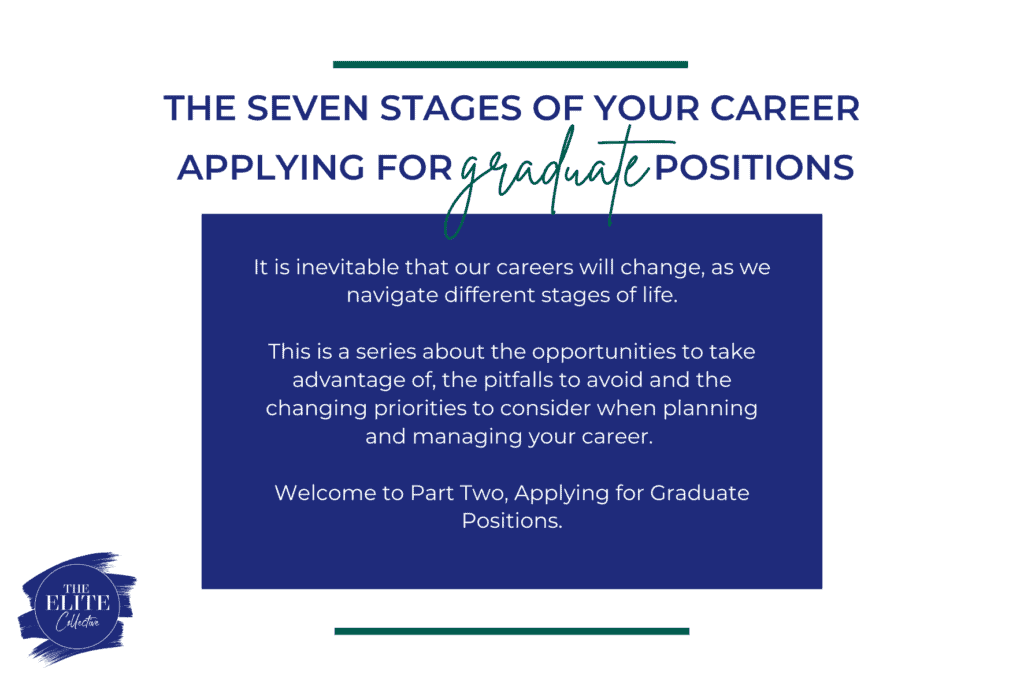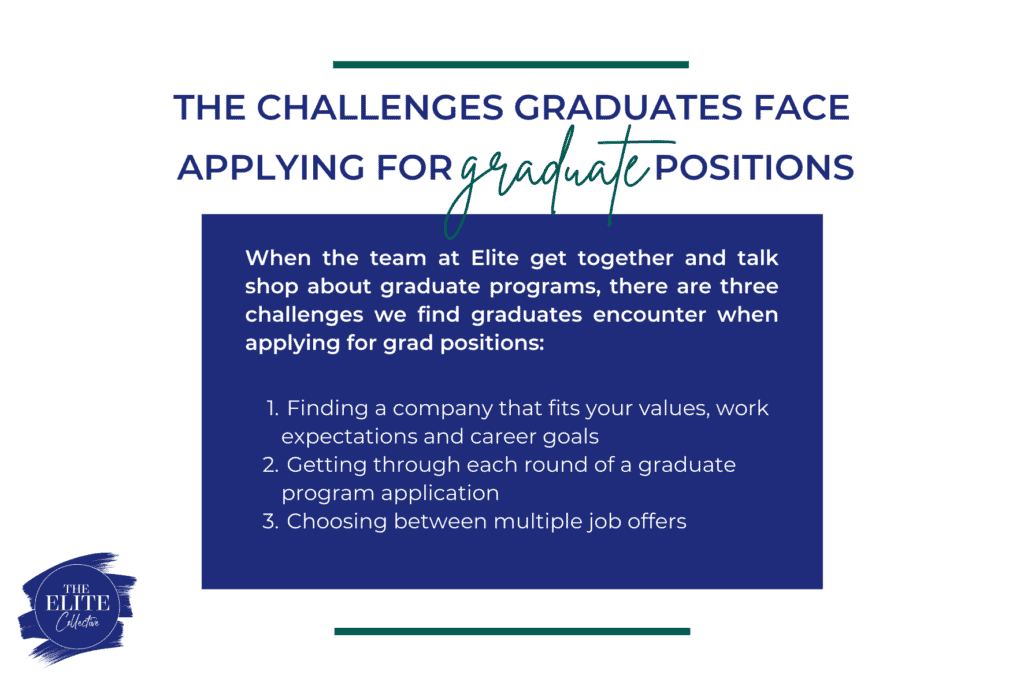 Danielle Bejr
Danielle Bejr

Finding graduate jobs as you’re nearing the end of years of study is an exciting time.
I remember applying for graduate roles like it was yesterday. I spent hours researching different companies, completing internships and summer vacation programs, networking and finishing SO many online assessments (If I ever have to complete another emotional intelligence quiz asking me what feelings a picture of rocks has, I might scream!).
I was lucky to be offered graduate jobs with one of the Big Four consulting firms, a government department, a resources company, a not-for-profit, and a bank. And after agonising for days over which program I would choose, I went on to complete a three-year program and moved up in the company, learning new skills along the way.
So, I know first-hand just how important it is to find the right graduate position that suits your needs.

With our combined experience as ex-graduates, as well as recruiting graduates in the past, we have a few tips and tricks that you might find handy below.
Some businesses have large graduate programs, while others may offer a single graduate role every other year. Neither is better than the other, but one may resonate more closely with your needs and career goals.
Start by thinking about what types of jobs you are interested in after you finish as a graduate. I know it can be hard to get the headspace to think about applying for grad roles during your last year of study, let alone the space to think about what your future might look like. The sooner you have an idea, the easier it is to apply for grad roles.
Once you know the jobs you are interested in, I recommend looking at companies that offer those roles through their website and social media to understand their values, work culture and vision. Companies with large programs will often get past graduates to share their grad experiences online and give you a good idea about how structured or unstructured the position is.
Attending events is another simple way you can collect information. From university careers fairs to industry events, use these as an opportunity to speak with current grads and employees to find out what working for a company is really like. Don’t be afraid to ask the hard questions either – my personal favourite is “If you could change one thing about your company culture, what would you choose and why?”
For a slightly more independent opinion, you can also review the Top100 Graduate Employers list and the Top Graduate Employers chart, which are updated every year. Each website uses a slightly different method to gather information from current graduates about what the program has been like across different criteria.
And finally, Whirlpool forums are still a thing. Get questions and answers about current programs and updates on the application processes from those also applying. Just remember that not everything you read online is true – so if something doesn’t sound right, confirm the facts with another information source.
Many graduate programs use a multistage process, or hurdle, to narrow down the number of applications. One year, the recruitment team I was working with received nearly 5000 applications for only 100 positions! Being able to cut down numbers quickly while keeping top-quality candidates was essential.
The first stage takes a lot of time on your behalf to get the ball rolling. Submitting a resume together with answers to a few selection criteria, a cover letter or even a two-minute video pitch are all common processes. To progress to the next stage, make sure that your documents and answers are tailored for the company you are applying for and show that you speak their language. And if you’re worried about ATS systems while applying for jobs in Australia – don’t be! We’ve addressed some ATS myths in our blog in the past.
The next stage is often online assessments. From checking math, writing and technical skills, through to creative thinking and emotional intelligence, be prepared for all sorts of tests to determine your aptitude. Some programs use the same assessment companies, so your scores are automatically transferred. You only have one opportunity to sit each quiz, so be sure to give yourself a quiet time and place to practice and then complete each assessment. Reach out and ask questions if you are unsure about how to complete the test.
If you make it to the interview round, congratulations! By this point, you are often in the top 20% of applicants. Interviews may occur via video conference, telephone, be pre-recorded or in-person depending on the program. Whatever the format of the interview, remember to use the time to not only showcase your unique skills and personality but also to ask questions about the company and work culture.
Interviews are sometimes part of an assessment centre process. Companies often then use assessment centres as a way for you and the organisation to get to know each other better. From being given a tour of the business’s building to meeting senior leaders, assessment centres can be both a nerve wracking and an exciting experience. Activities that are common include in-tray exercise, technical assessments, group activities, interviews, presentations, role plays and more. Companies don’t want you to fail and they try hard to set attendees up for success, so always listen carefully to exercise instructions and ask questions to clarify when needed.
And finally, selection! After making it through all the rounds, expect a phone call with an offer of a job or feedback about what you did well and how other candidates stood out. I recommend having a pen and paper with you for the call so that you can take notes, as emotions can run high during these calls.
Choosing between different graduate programs may seem like a great position to be in. But unless there is one company that you had your heart set on, picking just one option between several great programs is tough. You may even be given an offer before you have completed another application process!
When I had five incredible offers to choose between when I finished university, I used a pro’s and con’s list to get my priorities in order and make a choice. The information I considered to help me make my decision included:
Drawing up a simple comparison list answering questions like these helped me make the right choice for me, and not be swayed to look at what everyone else is doing.
At Elite, we love working with graduates! From supporting grads application documents to interview coaching, we have a few ways you can work with us to ensure you’re grad application ready – whether you are a nurse, an engineer, a logistics graduate or a lawyer.
This blog is the second in a series about navigating the opportunities, potential pitfalls and changing priorities of planning and managing your career.
I hope you enjoyed Part Two: Finding A Graduate Role and feel more confident applying for and selecting graduate positions for yourself! If you or someone you know are looking for a job for the first time, check out Part One here.
Or if you are no longer a graduate and would benefit from a few tips and tricks to build a meaningful and successful career, you can read Part Two here.
Our team of professional resume writers are located across Australia, specifically in Canberra, Melbourne and Sydney. We have clients throughout Australia who rave about our professional resume writing services, job application support and interview coaching. Get in touch with us today, and make your next career move with the support of a team of professionals.
We respectfully acknowledge the traditional custodians of the land upon which we live and work, the Ngunnawal people.
We acknowledge and respect their continuing culture and the contribution they make to the life of this city and this region, and extend that same respect to all Aboriginal and Torres Strait Islander people.
1 comment